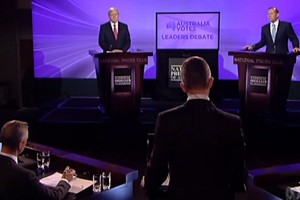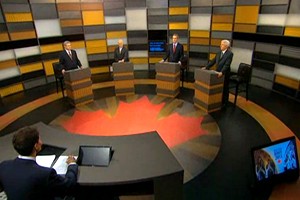Nigeria’s President-elect Muhammadu Buhari recently shunned them (which didn’t seem to hurt); UK Prime Minister David Cameron was all for them, then made a set of demands (not in April, not without the Greens); Canada is busily preparing for theirs; while Australia seems to be a dab hand and is required to have a lot of them
‘They’, are televised election debates – and they generate a world of controversy, speculation and political manoeuvering all of their own in the run-up to national or regional polls. This year sees another full calendar of nail-biting elections around the world, and as arguably more people than ever participate in elections globally, TV competitions between candidates are also on the increase.
Both Indonesia and Afghanistan held their first TV election debates last year, according to the Economist. In a mature democracy with a strong public broadcasting ecosystem, you’d expect the UK to be well-practised in allowing political leaders to be grilled on their policies and promises in the public media space – but the first televised debates in half a century only took place there in 2010.
Now it is again election year in the UK, and it has taken months of prevarication, negotiations, and threats by broadcasters to ‘empty chair’ the Prime Minister if he did not attend, to bring the UK viewing audience to yesterday’s 7-way leaders’ debate on ITV, a free-to-air commercial PSB. It’s not only ‘newness’ that has made things more difficult, but UK politics have moved from a two-party system to a fragmented multi-party scene in just a few years. So the debate over which leaders of emerging parties can appear has become protracted.
Election staple
Contrast this with Australia, where TV debates have been an election staple since 1984, with 90% of elections having televised debates. Although this less than perfect percentage indicates that even in Australia TV debates don’t happen without a lot of hard negotiation. The country has televised debates for both its federal (national) and state elections.

“Federal election debates are quite formal affairs,” says Eric Napper, ABC Australia’s News Editor for the Australian Capital Territory. They are also exclusively a two-horse ‘race’ – with only the two contenders for the job of Prime Minister having ever taken part, with questions asked through a moderator. “Politicians participating are very risk-averse,” Napper explains. He concedes it is often “dull” TV, “but it pulls an audience of 3 million” (in a population of 23 million) adding that ratings have stayed stable in the past few years.
Like the UK, Canada is also gearing up for a national election this year, in October. As in many countries holding TV debates, the main broadcasters form a consortium, a series of negotiations take place between the parties over dates, format, venue and so on. But compared to some other countries, Canada has fairly cut-and-dried rules for which parties qualify to take a podium.
However that hasn’t always prevented controversy – in 2011 the nation’s Green party mounted, and lost, a legal challenge for inclusion in the debates. Canada also handles the extra challenge of holding separate programmes in French and English, and ensuring that regional parties such as Bloc Québécois appear on a national stage.
“There was a lot of debate around the Green party [inclusion] and there has been some work done around that,” says Jennifer McGuire, General Manager and Editor-in-chief of News for the Canadian Broadcasting Corporation. She says the list of criteria for inclusion has been refined, and “We want to be more transparent with the public, and have a clear framework for the discussions.”

McGuire says that the consortium is at the early stages of planning for this year’s debates but has clear ideas on what it wants, so it can go to the political parties with a strong proposal. And there are still many things to play for. CBC commissioned their own research to look at debates around the world, and found everything from a series of themed debates India with politicians who weren’t necessarily the leaders, to a debate in Finland, called ‘Alone at Last’ with no moderator at all.
Debating debates
There’s also a drive to make the debate more informal, and “move it out of [the capital] and take it into communities, both in terms of venue and in terms of it being more social,” says McGuire. The broadcasters are also talking to tech and social media companies about partnerships. “Social media has brought more of a participatory emphasis to broadcasting,” she adds. Nevertheless in pure numbers, the French and English leaders’ debates drew a combined audience of 14 million – roughly 40% of the population.
And perhaps this is why experimenting with different formats is welcome. “The best debate I’ve been involved in recently is the South Australian one,” says the ABC’s Eric Napper, “we took questions from an audience, we also fielded questions from social media – it was informative and constructive.” The debate in the South Australian election last year followed a format similar to the UK’s BBC Question Time.
Social media has brought more of a participatory emphasis to broadcasting
But it is clear that it is easy to get mired in ‘debates about debates’ – formats, minor parties, scheduling, how scripted it all is. Is it even worth the trouble? Because the impact of televised debates, especially in an era of digital media, is also increasingly argued. A veteran of many UK elections, broadcast journalist Adam Boulton told the recent Polis journalism conference: “Turnout was up 2-3% last election, and I feel that the [TV] debates contributed to that.” He added that he wasn’t sure if they caused people to switch parties but “they inform and possibly reinforce their views.”
However in many countries television still has only limited often ‘urban’ reach and so televised debates have the potential to skew elections towards urban elites. But the key word is “inform”. Where television coverage is universal then televised debates on free-to-air impartial broadcast media are vital for citizens to make an informed choice in parliamentary democracies. Imperfections and difficulties aside, without them, in many countries that would leave little more than party political advertising, partisan text media and a series of leaders’ interviews to inform voting.
Related Posts
2nd August 2013
The Business of Broadcasting in the Digital Age – Speakers
10th December 2012
The true cost of broadcasting with public funding: accountability
A Manx tale: The CBA's Sally-Ann Wilson…